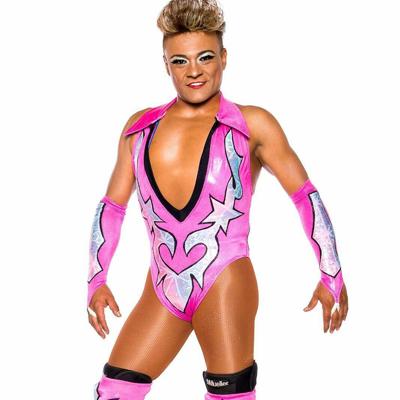As Gambit reported this week, the 2019 Ruler of the parade krewedelusion — one lowercase word, partially italicized — is iconic black New Orleans culture-bearer Lois Andrews Nelson, to honor her work preserving the Treme traditions krewedelusion draws from in part, and with which it aligns.
But Ms. Lois won't be the only royalty in delusion. The legendary Mexican professional wrestler and breakthrough gay athlete Cassandro is going to be riding in krewedelusion in a special role, the parade's protector, with the Krewe de Mayahuel and founding krewedelusion inner krewe Amigos de los Amigos as his honor guard.
Cassandro will remain in town for a 10-day residency, which his host, krewedelusion founding member Antonio Garza, is calling "Cassandro Conquers the Crescent City." After rolling with krewedelusion on Feb. 16, Cassandro will give a talk at Tulane's Freeman Auditorium Feb. 20.
Cassandro is one of the most famous "exóticos," a longstanding Mexican pro-wrestling archetype of male wrestlers who blur gender roles by cross-dressing and otherwise transgressing against heteronormativity. In 1992, Cassandro became the first exótico ever to win a championship in Mexico's storied Universal Wrestling Association. He's also wrestled for most of the larger North American wrestling federations, including AAA Lucha Libre, TNA and Ring of Honor.
For the krewedelusion 10th anniversary, Garza wanted to bring back a tradition from the parade's first year: masked luchadors with wrestling ring ropes acting as parade security. He says the idea of inviting Cassandro came in a flash. "If you're a Meccentric — an eccentric Mexican — in New Orleans, your heart and doors are always open and your eyes are always looking."
Part of the fun of Cassandro's residency will be the cultural exchange between the luchador and New Orleans. "It's a chance for him to meet New Orleans and for New Orleans to meet him. The crossroads of performance, costuming and conflict is such a natural fit," Garza says.
Krewe of ’tit Rex co-founder Brett Evans says Carnival goers shouldn’t underestimate the power of small. The krewe, which first rolled in 2009…
For example, Garza says, they discussed a costume Cassandro was having made. "In Chihuahua, there are unparalleled fabric stores, because both the Mennonite women and the [indigenous] Rarámuri favor these beautiful floral prints. But I was trying to explain Jefferson Variety to him — very different, but I think a place he'll be happy to get to know."
Since 2016, when The New Yorker ran a 9,000-word profile of Cassandro as a gay rights pioneer, he's experienced increasing fame beyond the wrestling world, appearing on British and U.S. talk shows. He's also the subject of a 2018 documentary, "Cassandro the Exotico!," which showed at the Cannes Film Festival.
Amigos de los Amigos, the krewedelusion subkrewe over which Cassandro will be reigning, dates "from the time after Katrina where I couldn't walk anywhere without being called amigo," Garza says.
"When Mexicans or Mexican-Americans come to New Orleans, you're not going top find a barrio or the conditions I grew up in. You gotta work a little more to find that presence. This krewe is one way of having that presence be in the streets, and I hope Cassandro's presence will be a rallying call."
Recruiting for Amigos de Los Amigos, Garza says, has given him a chance to reach out into communities and invite participation from people who aren't normally in contact with downtown parading.
"When you are with the parade, you start to feel some of the beauty," he says, "and it becomes to feel more familiar. People who help push our floats or do security then become part of the parade. Imagine you're an immigrant here in New Orleans, and then you put on this lucha libre mask and suddenly you're in this position of authority, inside this beautiful revelry."
When Keith Twitchell, then-captain of Krewe du Vieux, went to meet then-District C City Councilman Troy Carter at City Hall, he found that Car…
The notion of donning a mask to become a heroic Mexican everyman is part of the mystique of lucha libre, and it's something Garza's long been interested in intermingling with the masking traditions of New Orleans Carnival — including as n means to explore or unpack facets of American identity politics.
"I think of it as an opportunity to complicate what it means to have intercultural and interethnic costuming," Garza says. "New Orleans' connection to Latin America comes out even more during Carnival, and it's not a University campus or Halloween culture. Not that those things aren't important, but I want these challenging conversations about what it means to put on these costumes and identities. They say that whatever you mask for as Mardi Gras, you slowly become."
Cassandro himself, a gay man who cross-dresses professionally and whose wrestling persona hinges on gender ambiguity, also is an appropriately category-defying figure for the parade. "North Americans, Anglo-Americans sometimes make assumptions about whose culture is more open or 'humanity-forward,'" Garza says, "but it's not that tidy. Cassandro is a he, and uses the male pronoun, but also inhabits this specific gender-conflicting cultural role that's existed for decades."
Cassandro is also a binational native of "La Frontera," the nationally non-binary zone between the United States and Mexico, so his presence here in 2019 also evokes the politicization of the border.
"When Latin Americans have come here by banana boat or because of the coffee trade," Garza says, "many people in New Orleans will include them in the tapestry of the city. But when they're coming by land across the Gulf South they're considered a foreign fabric, only allowed to darn or mend what has been torn. Yet Mexicans and Mexican-Americans have been here long before Katrina."
Garza's also excited about having Krewe de Mayahuel, a parading group founded to celebrate Mexican culture, joining krewedelusion this year. "I hope this continues to grow," he says, "and that delusion will be a place that brings and cultivates more of that presence as we go forward — as it has been since the beginning."
Cassandro, who touched down in New Orleans shortly before press time, already hasjumped into the swing of things, helping bedazzle the float on which he'll ride. It's his first time in New Orleans, and he says, "I love the city already-- beautiful, gorgeous, green. It's a great honor to be here and take part in this Carnival tradition."
— Cassandro's appearance at Tulane University Feb. 20 will be followed by a reception from 8:30 to 10 p.m. at the LGBT Community Center, 2727 South Broad.



